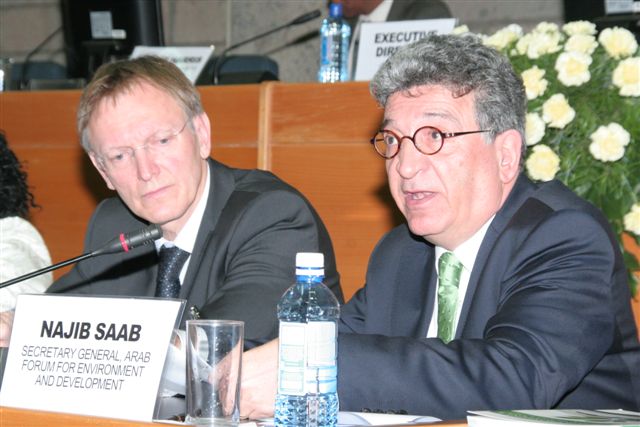Green Economy is Re-Branding of Sustainable Development

Najib Saab delivering his remarks. To the left: Janez Potočnik, European Environment Commissioner.
Nairobi, 21 February 2012 - AFED’s Secretary General Najib Saab was a panelist at a ministerial roundtable on Green Economy, during the UNEP Governing Council and the Global Ministerial Environment Forum (GC/GMEF) in Nairobi on 21 February. In face of some expressed doubts about green economy, in a typical ‘conspiracy theory’ fashion which reminds of the debate on climate change, Saab presented and discussed findings of AFED Green Economy report, and stressed 3 main points: 1)Transitioning to the green economy brings net benefits to the Arab region- as proven in facts and figures of AFED report covering 8 sectors; 2)Green economy, as we understand it, is “re-branding” of “sustainable development”, to seize the prevailing global economic crisis. As sustainable development is globally accepted, there is no justification to obstruct green economy; 3)green economy should not be used as a pretext to impose trade barriers, but fears should not lead to rejection and isolationism, but more effort to establish a strong green growth knowledge platform and true transfer of technology.
Here is full trancript:
Talking Points by Najib Saab, Secretary General, Arab Forum for Environment & Development (AFED)
At the twelfth special session of UNEP’s Governing Council and the Global Ministerial Environment Forum (GMEF)
Ministerial Panel on Green economy in the context of sustainable development and poverty eradication, Nairobi, 21 February 2012
Green Economy in a Changing Arab World, the report recently produced by the Arab Forum for Environment and Development (AFED), focuses on how green economy can help to navigate a sustainable transition in the Arab countries.
One major demand which drove people to the streets was the plight for decent jobs. On this topic, a main finding of the AFED report is that transitioning to a green economy helps to generate decent and lasting job opportunities. And when people whose lives are most impacted have more say in shaping policy decisions, this will result in better management of natural resources.
Arab development strategies continue to be dominated by investments in extractive commodity products earmarked for export markets. These industries require high initial investments but generate low levels of employment. Despite generating high GDP growth, this model leaves Arab economies more vulnerable to global market volatilities, while failing to significantly create jobs. The lack of income diversification is a primary cause of the structural weakness of Arab economies.
Here are some telling figures:
- Population of the Arab countries has increased from 100 million in 1960 to about 400 million in 2012. Among them, 65 million are poor and 45 million lack access to clean water and sanitation services.
- The average rate of unemployment in Arab region is 10%, reaching 18% in some countries. Youth unemployment rate averages at over 25%, double the average world rate, and the figure reaches 40% in some countries. Unemployed youth accounted for more than 70% of total unemployment in Egypt, Jordan and Yemen. Those constitute the bulk of demonstrators in Arab streets.
Can Arab economies, as currently structured, create 60 million new jobs, which is the number projected to be required by 2020?
Here are some key findings of the AFED report on Green Economy, relating to selected sectors:
WATER: AFED report estimates that Arab countries will need to allocate at least 1.5% of their GDP annually to investments in clean sanitation, water infrastructure, innovative water efficiency, and recycling technologies in order to meet the expected rise in water demand. This amounts to US$28 billion annually. Such green investments will create jobs in both rural and urban regions.
AGRICULTURE: Shifting to sustainable agricultural practices is expected to result in savings to Arab countries of between 5-6% of GDP as a result of increased water productivity and protected environmental resources. This amounts to $114 billion annually, and millions of jobs in rural areas, where 76% of the poor in the Arab region live.
ENERGY: An investment of US$100 billion annually in renewable energy is expected to create about 565,000 new jobs. A reduction in average per capita consumption of electricity in Arab countries to the world average, through energy efficiency measures, would generate savings of $73 billion annually. A 25% reduction in energy subsidies would free up over $100 billion over a three year period, that can be shifted to green energy and millions of jobs.
TRANSPORTATION: Public transit systems and vehicle fuel efficiency standards have to be established. 50% greening of the Arab transport sector generates savings of US$23 billion annually.
BUILDINGS: AFED report estimates that spending US$100 billion in greening only 20% of the existing building stock in the Arab countries over the next 10 years, mainly for retrofitting, is expected to create 4 million jobs.
If Arab governments commit to greening the construction sector, spending will have to increase by about 20% resulting in additional investments of about US$30 billion, and the creation of 10% more jobs.
The willingness to pursue a green economy agenda provides a window of opportunity to initiate fundamental re-examination of current public policies in Arab countries. Some countries fear that green economy might be used in a protectionist manner to impose trade barriers. The answer is not in resorting to isolationism, but in establishing a strong green growth knowledge platform and the true transfer of technology.
Green Economy, after all, requires the transformation from the prevailing ‘virtual economy’, primarily based on sales of raw extractive products and speculation in real estate and financial markets, to a ‘real economy’ focusing on sustainable production, which alone can protect the natural capital and generate long term jobs.
| 



